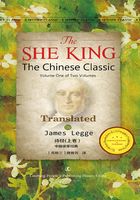
T'AOU YAOU
1 The peach tree is young and elegant;
Brilliant are its flowers
This young lady is going to her future home,
And will order well her chamber and house.

蟄蟄, is the appearance of their being 'clustered together like insects in their burrows'. Maou makes it='harmoniously collected'.
The rhymes are—in st.1, 詵*, 孫, 振*, cat.13: in 2,薨, 繩, cat.6: in 3, 揖, 蟄, cat.7,t.3.
The idea of all the critics is that Wăn's queen lived harmoniously with all the other ladies of the harem, so that all had their share in his favours, and there was no more quarrelling among them than among a bunch of locusts. All children born in the palace would be the queen's; and it was right they should increase as they did.—Surely this is sad stuff.
Ode 6. Allusive. PRAISE OF A DRIDE GOING TO BE MARRIED. The critics see a great deal more in the piece than this;—the happy state of Chow, produced by king Wăn (acc. to Choo), or by T'ae-sze (acc. to Maou), in which all the young people were married in the proper season, i.e., in the spring, when the peach tree was in flower, and at the proper age,i.e., young men between 20 and 30, and girls between 15 and 20. It was a rule of the Chow dyn. that marriages should take place in the middle of spring (Chow Le, II. vi. 54). This marriage would be about that time, and the peach tree was in flower; but it was only the latter circumstance which was in the poet's mind.
St.1. L.1. 之 may be taken as the sign of the genitive, the whole line being= 'in the young and beautiful time of the peach tree'. Still, 之 is so constantly used throughout the She in the middle of lines, where we can only regard is as a particle, eking out the number of feet, that it is, perhaps, not worth while to resolve such lines as this in the above manner. 夭夭 (Shwoh-wăn, with 木 at the side) denotes 'the appearance of youth and elegance'. L.2. 灼灼 is descriptive rather of the brilliance of the flowers than of their luxuriance,as Choo has it. The young peach tree is allusive of the bride in the flush of youth, and its brilliant flowers o her beauty. L.3. 之=是, 'this'; 子= 'young lady'. Maou and Ch'ing take 于 as=往, 'to go to'. But it is better to regard it as a particle, as in Ode II.1. 歸 here is used of the bride going to her husband's house. As Choo says,women speak of being married as going home (婦人謂嫁曰歸). Should we take 之子 in the singular or plural? Lacharme translates it by puelloe nobiles, and Heu Hëen (許謙; Yuen dyn.) says, 'The poet saw the thing going on from the flowering of the peach tree till the fruit was ripe;—the young ladies were many.' This seems to me very unpoetical. L.4. 室 is the chamber appropriated to husband and wife; 家 is 'all within the door',=our house. 室家 here, 家室 in st.2, and 家人in st.3. convey the same idea, the terms being varied for the sake of the rhythm. Tso-she says that when a couple marry, the man has a 室, and the woman a 家; so that 室家 are equivalent to husband and wife.

2 The peach tree is young and elegant;
Abundant will be its fruit.
This young lady is going to her future home,
And will order well her house and chamber.
3 The peach tree is young and elegant;
Luxuriant are its leaves.
This young lady is going to her future home,
And will order well her family.


